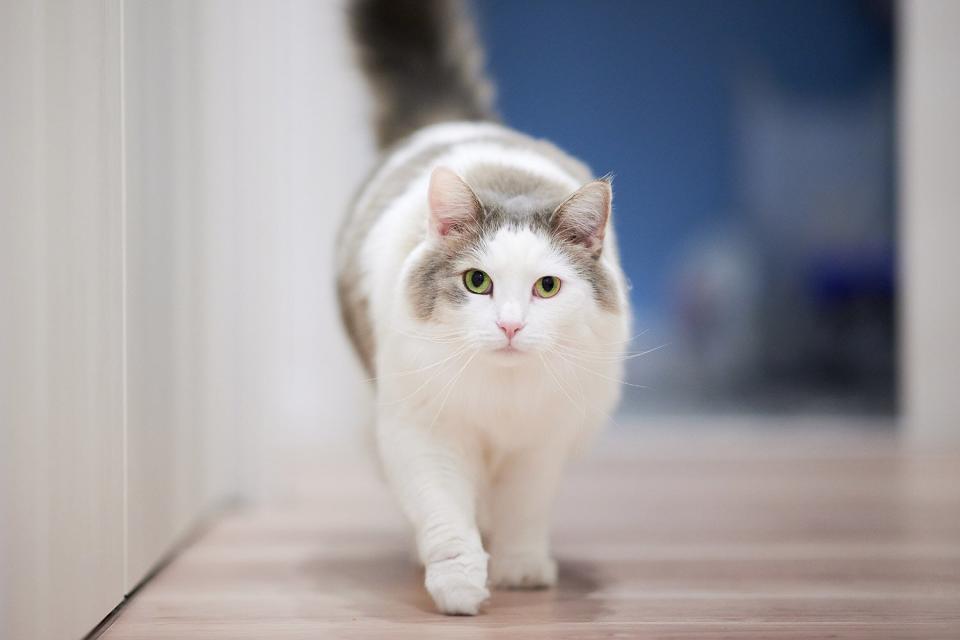Hundreds of Cats Dead in the U.K. from Serious Illness Prompting Investigation into Recalled Cat Food

getty
Hundreds of cats in the United Kingdom have died from a rare illness that may be linked to toxins recently discovered recalled cat food.
More than 300 cats have died from feline pancytopenia, a condition that occurs when red and white blood cell and platelet levels decrease, causing serious illness, according to the Royal Veterinary College (RVC).
While initial symptoms, like lethargy and lack of appetite, may be difficult to diagnose, more dangerous symptoms include bleeding from the mouth and blood in the urine or stool.
As of August 2, there were at least 528 reports of feline pancytopenia in the UK. It has around a 63.5 percent mortality rate, the RVC reported.
However, the actual number of cases is likely higher, because "only a small percentage of the vets in the U.K. are actively reporting to the RVC at this time," the college said.
RELATED: New Study Says Dogs Can Tell When People Are Lying to Them
So far, an investigation into the illness' outbreak hasn't been linked to any common feline infectious diseases or common toxins, prompting an investigation into several cat food brands that were recalled in June, including Sainsbury's hypoallergenic dry foods, Pets at Home's Applaws and AVA cat foods.
"Our investigations are ongoing and we are still collecting data from practicing veterinarians, as well as testing food samples associated with affected and unaffected cats to determine the significance of these findings. We have shared our results with the [Food Standards Agency (FSA)] in order to assist them with their investigations into this matter," RVC said in a statement.
Never miss a story — sign up for PEOPLE's free daily newsletter to stay up-to-date on the best of what PEOPLE has to offer, from juicy celebrity news to compelling human interest stories.
In a July 16 statement, the FSA said that mycotoxins — which "do not, in themselves, indicate they are the cause of feline pancytopenia" — were found "in a small number of samples of the recalled cat food tested to date."
Mycotoxins are naturally occurring toxins produced by various fungi and can grow on several different foods including cereals, dried fruits, nuts and spices, according to the World Health Organization (WHO). They can "cause a variety of adverse health effects and pose a serious health threat to both humans and livestock," according to the WHO.
RELATED VIDEO: Bobby Flay and His Cat Nacho Create a Cat Food Brand with Your Feline In Mind: 'We're Thrilled'
However, it remains unclear whether the mycotoxins in the recalled cat foot is linked to the feline pancytopenia outbreak.
A representative for Fold Hill Foods, the manufacturer for the recalled brands, said in a statement to PEOPLE: "On the 15th June Fold Hill Foods issued a voluntary and precautionary recall of selected cat food products from AVA, Sainsbury's and Applaws. This was fully supported by the Food Standards Agency (FSA). Assisting the FSA's investigation is an absolute priority for the business and there are a number of tests on food samples and ingredients being conducted by independent laboratories. As stated by the FSA, there is no definitive evidence to confirm a link at this stage between the cat food products and feline pancytopenia.
"We continue to fully co-operate with both the FSA and the Royal Veterinary College as they continue to investigate all potential causes of the Pancytopenia cases, feed and non-feed related. As cat owners ourselves, we fully understand how upsetting and stressful this situation is and the urgent need to establish why there has been an increase in cases of Pancytopenia in the UK."
Pet owners are encouraged to check their cat food to ensure the product hasn't been recalled. If it has been, owners should stop using the food and contact their vet if they have concerns about their cat's health, according to the FSA.

 Yahoo Finance
Yahoo Finance 